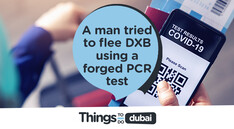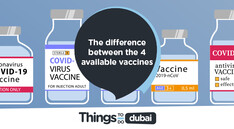Coronavirus: All things COVID-19
Get all your updates on coronavirus, developments, news and more in the UAE and around the world.

As of June 7th 2020, the cases in the UAE have reached 38,808 with recoveries at 21,806. The highest affected country still stands to be the United States of America with over 2,000,931 cases and 112,326 deaths. Brazil, Russia & Spain leaving a significant yet deadly gap by following.
Needless to say, COVID-19 has put a pause on many people's lives. Financially, mentally and physically, the virus has spread across six continents, and government authorities are trying their best to keep the situation contained. The UAE has encouraged and/or mandated precautions to help nip the spread in the bud.
Unfortunately, because of the constant and instant change of the situation, we have listed a few most asked questions asked in regards to COVID-19. While some are taking advantage of this time and learning new skills, becoming Masterchefs or simply binge-watching all the series' backlogged - we just want to say this is not a competition, we're in this together and will get out of this together. So if it's taking me time to relax and laze around or to build a giant Burj Khalifa lego structure - do what you must, but don't feel pressurised into keeping up with everyone else.
What is COVID-19?
COVID-19 is an infectious disease caused by the most recently discovered coronavirus. This new virus and disease were unknown before the outbreak began in Wuhan, China, in December 2019. COVID-19 is now a pandemic affecting many countries globally. (WHO, 2020).
What are the symptoms of COVID-19?
The most common symptoms are fever, dry cough, and tiredness. Other symptoms that are less common and may affect some patients include aches and pains, nasal congestion, headache, conjunctivitis, sore throat, diarrhoea, loss of taste or smell or a rash on skin or discolouration of fingers or toes. These symptoms are usually mild and begin gradually. Some people become infected but only have very mild symptoms.
Most people (about 80%) recover from the disease without needing hospital treatment. Around 1 out of every 5 people who get COVID-19 becomes seriously ill and develops difficulty breathing. (WHO, 2020).
How can we protect others and ourselves if we don't know who is infected?
Practising hand and respiratory hygiene is important at ALL times and is the best way to protect others and yourself.
When possible maintain at least a 1-meter distance between yourself and others. This is especially important if you are standing by someone who is coughing or sneezing. Since some infected persons may not yet be exhibiting symptoms or their symptoms may be mild, maintaining a physical distance with everyone is a good idea if you are in an area where COVID-19 is circulating. (WHO,2020).
What is the difference between self-isolation, self-quarantine and distancing?
Quarantine means restricting activities or separating people who are not ill themselves but may have been exposed to COVID-19. The goal is to prevent the spread of the disease at the time when people just develop symptoms.
Isolation means separating people who are ill with symptoms of COVID-19 and may be infectious to prevent the spread of the disease.
Physical distancing means being physically apart. WHO recommends keeping at least 1-metre distance from others. This is a general measure that everyone should take even if they are well with no known exposure to COVID-19. (WHO, 2020).
For more information visit www.who.int/emergencies/diseases/novel-coronavirus-2019/













 A man attempted to flee DXB using a forged PCR test
A man attempted to flee DXB using a forged PCR test COVID 19: Vaccine clinics on the go in Dubai
COVID 19: Vaccine clinics on the go in Dubai COVID-19: Precautionary measures extended till the beginning of Ramadan
COVID-19: Precautionary measures extended till the beginning of Ramadan COVID-19: The difference between the four available vaccines
COVID-19: The difference between the four available vaccines Dubai closes down 32 food spots for violating COVID-19 regulations
Dubai closes down 32 food spots for violating COVID-19 regulations